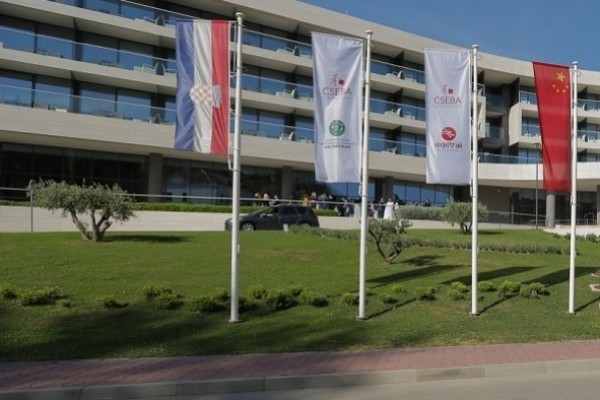| CSEBA most responsible for positive perceptions about the Chinese | |

| Author: Matej Balen |
| 25th October 2019 |
| ZAGREB - We are entering into a “diamond period” of our relations, said Chinese Prime Minister Li Keqiang in April this year, during his state visit to Croatia, while the country was hosting the “16+1” Summit in Dubrovnik City. |
|
This was a definite sign of a change in the dynamics of Sino-Croatian relations, but also a sign of a change in perception on Chinese capital investments into the Republic of Croatia, which we haven’t looked at in a positive manner until very recently. In 2009, at the time current China’s President Hu Jintao arrived to Croatia for a bilateral visit at the very beginning of the largest wave of Chinese opening to the world, unambiguously offering us strategic partnership in Europe, also bringing along a huge political and business delegation from China ready to make concrete cooperation agreements. Croatia missed this great opportunity and China turned to other countries in the region, notably Greece, Serbia, Hungary, the Czech Republic and Poland. While Croatia was asking for investments from the Western countries (which weren't even coming), we completely ignored invitations from China, probably unaware how much economic growth and financial capital had already been generated in this Far East country. In those moments, Croatia perhaps knew about China even less than Chinese knew about Croatia. This ignorance from our side was even more astonishing knowing the fact that China had huge respect towards Croatia based on our historical connections and our historical heritage. Five years later, China initiated and launched global Investment Initiatives "16+1" and the "Belt and Road" which Croatia mostly ignored in their early stages. The year 2014 marks the official registration of the Chinese Southeast European Business Association (CSEBA), after obtaining the official approval from the Communist Party of China for its business activities, with the aim to assist private Chinese investors in Southeast European region. Extremely difficult beginnings were filled with numerous meetings with Chinese government, provincial and city leaders, CEOs of the largest private and state-owned companies and Chinese business communities. We participated in hundreds of promotional activities regarding investment, tourism and other specialized fields at Expo fairs, forums and conferences presenting project opportunities, legislation, our cultural, and trying to reduce potentially negative perception in China about investing into Croatia. It should also be noted that at the very beginning CSEBA also had a great deal of help from former Croatian President Stjepan Mesic, who has very respected within Chinese state and party leadership. Over time, we gradually changed Croatian political distrust unwilling to accept Chinese capital. We were constantly explaining that the "strict" Brussels and Berlin, while blackmailing and punishing us if cooperating with China, were themselves more than open to accept the same Chinese capital investments to develop their own economic and bilateral relations with China. First, the real investments are finally present and noticeable through private Chinese investments into congress tourism in Kumrovec, hotel infrastructure and health tourism in Krapinske Toplice, constant contacts and arrivals of Chinese delegations to Osijek and Zadar, in areas that offer perspective for development in logistics, infrastructure, transport and tourism. In addition, Croatia has become more interesting than ever to China. Chinese tourists perhaps like it because of football popularity and the Game of Thrones, but serious Chinese investors now like Croatia because they can be sure that their specific interest and concrete investment proposal will certainly be taken more seriously in Croatia. After years of effort in educating, promoting economic cooperation and presenting investment projects, Chinese delegations that are now coming here are very familiar with Croatia, unafraid to show what they are interested in. Previous years that wasn’t always the case. However, they still point out that the reasons why Croatia's geostrategic advantages have previously not been utilized better are still unclear to them, and they themselves offer numerous suggestions on possible development paths. They continue to enquire about new interesting investment opportunities in a number of different areas, ranging from infrastructure, hotel and tourism construction, to logistics, free trade zone development, technology, sport and culture. But for each of these projects they are looking for a long-term profitable investment and a trusted partner. According to research, Croats today welcome Chinese activities and support Chinese investments into Croatia. Croatian politicians, both at the state and local levels, are following this trend and show no fear to have Chinese capital in their local community. At the national level, there is less fear to potentially negative comments from the centre of the European Union. China, on the other hand, is equally pleased to enjoy Croatia's more active political participation in the Chinese initiatives "17+1" and the "Belt and Road". But more importantly, both sides actually benefit the most through successful implementation of joint projects based on real economic needs and investment opportunities. That is why we can confidently say that in the past five years we have fundamentally changed our perception of China and thus fulfilled our most difficult and important task.
|
 |
|
| 23rd November 2024 | |
| China has good news for Croatian citizens | |
 |
|
| 7th November 2024 | |
| Pelagos net farm products presented at the Shanghai fai | |